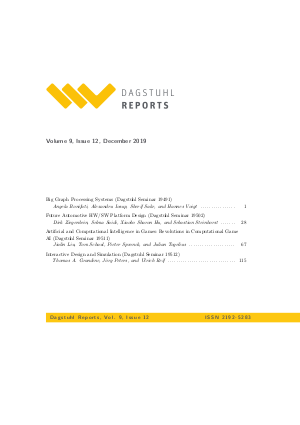Dagstuhl Reports, Volume 9, Issue 12
-
Part of:
Volume:
Dagstuhl Reports, Volume 9
Journal: Dagstuhl Reports (DagRep)

Event
- Dagstuhl Seminars 19491, 19502, 19511, 19512
Publication Details
- published at: 2020-04-14
- Publisher: Schloss Dagstuhl – Leibniz-Zentrum für Informatik
- DBLP: db/journals/dagstuhl-reports/dagstuhl-reports9
Access Numbers
- Detailed Access Statistics available here
-
Total Document Accesses (updated on a weekly basis):
0PDF Downloads
Documents
Dagstuhl Reports, Volume 9, Issue 12, December 2019, Complete Issue
Abstract
Cite as
Dagstuhl Reports, Volume 9, Issue 12, pp. 1-136, Schloss Dagstuhl – Leibniz-Zentrum für Informatik (2020)
Copy BibTex To Clipboard
@Article{DagRep.9.12,
title = {{Dagstuhl Reports, Volume 9, Issue 12, December 2019, Complete Issue}},
pages = {1--136},
journal = {Dagstuhl Reports},
ISSN = {2192-5283},
year = {2020},
volume = {9},
number = {12},
publisher = {Schloss Dagstuhl -- Leibniz-Zentrum f{\"u}r Informatik},
address = {Dagstuhl, Germany},
URL = {https://drops.dagstuhl.de/entities/document/10.4230/DagRep.9.12},
URN = {urn:nbn:de:0030-drops-120074},
doi = {10.4230/DagRep.9.12},
annote = {Keywords: Dagstuhl Reports, Volume 9, Issue 12, December 2019, Complete Issue}
}
Dagstuhl Reports, Table of Contents, Volume 9, Issue 12, 2019
Abstract
Cite as
Dagstuhl Reports, Volume 9, Issue 12, pp. i-ii, Schloss Dagstuhl – Leibniz-Zentrum für Informatik (2020)
Copy BibTex To Clipboard
@Article{DagRep.9.12.i,
title = {{Dagstuhl Reports, Table of Contents, Volume 9, Issue 12, 2019}},
pages = {i--ii},
journal = {Dagstuhl Reports},
ISSN = {2192-5283},
year = {2020},
volume = {9},
number = {12},
publisher = {Schloss Dagstuhl -- Leibniz-Zentrum f{\"u}r Informatik},
address = {Dagstuhl, Germany},
URL = {https://drops.dagstuhl.de/entities/document/10.4230/DagRep.9.12.i},
URN = {urn:nbn:de:0030-drops-120088},
doi = {10.4230/DagRep.9.12.i},
annote = {Keywords: Table of Contents, Frontmatter}
}
Big Graph Processing Systems (Dagstuhl Seminar 19491)
Abstract
Cite as
Angela Bonifati, Alexandru Iosup, Sherif Sakr, and Hannes Voigt. Big Graph Processing Systems (Dagstuhl Seminar 19491). In Dagstuhl Reports, Volume 9, Issue 12, pp. 1-27, Schloss Dagstuhl – Leibniz-Zentrum für Informatik (2020)
Copy BibTex To Clipboard
@Article{bonifati_et_al:DagRep.9.12.1,
author = {Bonifati, Angela and Iosup, Alexandru and Sakr, Sherif and Voigt, Hannes},
title = {{Big Graph Processing Systems (Dagstuhl Seminar 19491)}},
pages = {1--27},
journal = {Dagstuhl Reports},
ISSN = {2192-5283},
year = {2020},
volume = {9},
number = {12},
editor = {Bonifati, Angela and Iosup, Alexandru and Sakr, Sherif and Voigt, Hannes},
publisher = {Schloss Dagstuhl -- Leibniz-Zentrum f{\"u}r Informatik},
address = {Dagstuhl, Germany},
URL = {https://drops.dagstuhl.de/entities/document/10.4230/DagRep.9.12.1},
URN = {urn:nbn:de:0030-drops-120098},
doi = {10.4230/DagRep.9.12.1},
annote = {Keywords: Abstractions, Big Data, Big Graph, data management, Ecosystems, graph processing, Performance, systems, Theory}
}
Future Automotive HW/SW Platform Design (Dagstuhl Seminar 19502)
Abstract
Cite as
Dirk Ziegenbein, Selma Saidi, Xiaobo Sharon Hu, and Sebastian Steinhorst. Future Automotive HW/SW Platform Design (Dagstuhl Seminar 19502). In Dagstuhl Reports, Volume 9, Issue 12, pp. 28-66, Schloss Dagstuhl – Leibniz-Zentrum für Informatik (2020)
Copy BibTex To Clipboard
@Article{ziegenbein_et_al:DagRep.9.12.28,
author = {Ziegenbein, Dirk and Saidi, Selma and Hu, Xiaobo Sharon and Steinhorst, Sebastian},
title = {{Future Automotive HW/SW Platform Design (Dagstuhl Seminar 19502)}},
pages = {28--66},
journal = {Dagstuhl Reports},
ISSN = {2192-5283},
year = {2020},
volume = {9},
number = {12},
editor = {Ziegenbein, Dirk and Saidi, Selma and Hu, Xiaobo Sharon and Steinhorst, Sebastian},
publisher = {Schloss Dagstuhl -- Leibniz-Zentrum f{\"u}r Informatik},
address = {Dagstuhl, Germany},
URL = {https://drops.dagstuhl.de/entities/document/10.4230/DagRep.9.12.28},
URN = {urn:nbn:de:0030-drops-120101},
doi = {10.4230/DagRep.9.12.28},
annote = {Keywords: automotive, hw/sw platforms, real-time systems, systems design automation}
}
Artificial and Computational Intelligence in Games: Revolutions in Computational Game AI (Dagstuhl Seminar 19511)
Abstract
Cite as
Jialin Liu, Tom Schaul, Pieter Spronck, and Julian Togelius. Artificial and Computational Intelligence in Games: Revolutions in Computational Game AI (Dagstuhl Seminar 19511). In Dagstuhl Reports, Volume 9, Issue 12, pp. 67-114, Schloss Dagstuhl – Leibniz-Zentrum für Informatik (2020)
Copy BibTex To Clipboard
@Article{liu_et_al:DagRep.9.12.67,
author = {Liu, Jialin and Schaul, Tom and Spronck, Pieter and Togelius, Julian},
title = {{Artificial and Computational Intelligence in Games: Revolutions in Computational Game AI (Dagstuhl Seminar 19511)}},
pages = {67--114},
journal = {Dagstuhl Reports},
ISSN = {2192-5283},
year = {2020},
volume = {9},
number = {12},
editor = {Liu, Jialin and Schaul, Tom and Spronck, Pieter and Togelius, Julian},
publisher = {Schloss Dagstuhl -- Leibniz-Zentrum f{\"u}r Informatik},
address = {Dagstuhl, Germany},
URL = {https://drops.dagstuhl.de/entities/document/10.4230/DagRep.9.12.67},
URN = {urn:nbn:de:0030-drops-120113},
doi = {10.4230/DagRep.9.12.67},
annote = {Keywords: artificial intelligence, computational intelligence, game theory, games, optimization}
}
Interactive Design and Simulation (Dagstuhl Seminar 19512)
Abstract
Cite as
Thomas A. Grandine, Jörg Peters, and Ulrich Reif. Interactive Design and Simulation (Dagstuhl Seminar 19512). In Dagstuhl Reports, Volume 9, Issue 12, pp. 115-134, Schloss Dagstuhl – Leibniz-Zentrum für Informatik (2020)
Copy BibTex To Clipboard
@Article{grandine_et_al:DagRep.9.12.115,
author = {Grandine, Thomas A. and Peters, J\"{o}rg and Reif, Ulrich},
title = {{Interactive Design and Simulation (Dagstuhl Seminar 19512)}},
pages = {115--134},
journal = {Dagstuhl Reports},
ISSN = {2192-5283},
year = {2020},
volume = {9},
number = {12},
editor = {Grandine, Thomas A. and Peters, J\"{o}rg and Reif, Ulrich},
publisher = {Schloss Dagstuhl -- Leibniz-Zentrum f{\"u}r Informatik},
address = {Dagstuhl, Germany},
URL = {https://drops.dagstuhl.de/entities/document/10.4230/DagRep.9.12.115},
URN = {urn:nbn:de:0030-drops-120120},
doi = {10.4230/DagRep.9.12.115},
annote = {Keywords: simulation of physical systems, geometric models for engineering analysis, partial differential equations, interactive and real-time computation splines, model reduction}
}